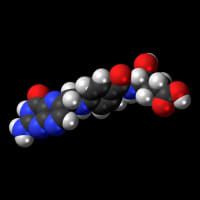Folic Acid (Pteroilomonoglutamic acid) is a compound which belongs to the B group of vitamins, it can be referred to as Vitamin B9.[1]
Biological Activity
Humans do not synthesize the endogenous form of folic acid; therefore, it is vital to supplement this vitamin in its natural form or multivitamin preparations. The most folic acid is found in the green leafy vegetables (spinach, peas, asparagus) and in offal (liver).[1:1]
In the body it is subject to processes that transfer its inactive form into a form responsible for biological effects of folic acid, i.e. 5-methyltetrahydrofolate (5-MTHF).[1:2]
DNA Synthesis
It is responsible for processes of the correct biosynthesis of purine and pyridine bases present in the formation of DNA and RNA molecules.[1:3]
An adequate supply of folic acid is especially indicated in pregnant women with a reduced amount of folic acid due to its use by an intensively developing foetus.[1:4]
Healing Properties
Disease / Symptom Treatment
Study Type: Meta Analysis
Title: Folic acid – role in the body, recommendations and clinical significance
Author(s): Aneta Myszczyszyn, Rafał Krajewski, Monika Ostapów, Lidia Hirnle
Institution(s): Department and Clinic of Gynaecology and Obstetrics, Wroclaw Medical University, Wroclaw, Poland; Gynaecology and Obstetrics Interdisciplinary Students’ Association, Wroclaw Medical University, Wroclaw, Poland
Publication: Nursing in the 21st Century
Date: 2019-05-22
Abstract: Introduction. Folic acid is a compound classified as B group vitamins. In the body it is subject to processes that transfer its inactive form into a form responsible for biological effects of folic acid, i.e. 5-methyltetrahydrofolate (5-MTHF). It is, in particular, responsible for processes of the correct biosynthesis of purine and pyridine bases present in the formation of DNA and RNA molecules. Humans do not synthesize the endogenous form of folic acid; therefore, it is vital to supplement this vitamin in its natural form or multivitamin preparations. The most folic acid is found in the green leafy vegetables (spinach, peas, asparagus) and in offal (liver). An adequate supply of folic acid is especially indicated in pregnant women with a reduced amount of folic acid due to its use by an intensively developing foetus. The recommended dose of folic acid during this period is 0.4 mg/24h and this dose varies depending on the patient’s and her family’s medical history. The updated state of knowledge on the role of vitamin B9 in the body has been presented. The importance of its supplementation in specific clinical cases was analyzed. Summary. Many studies indicate an important role of the folic acid in the prevention of congenital defects of the nervous, cardiovascular and urogenital systems. Its deficiency increases the risk of complications in pregnancy, such as recurrent miscarriages, pre-eclampsia or postpartum haemorrhage. For this reason, a prophylactic folic acid supplementation is recommended, in women with increased risk of its deficiency, in particular.
Link: Source
Citations: ↩︎ ↩︎ ↩︎ ↩︎ ↩︎
